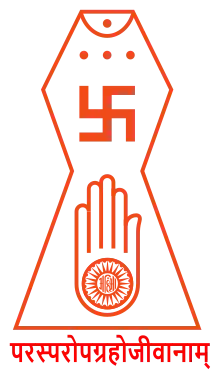| Nyāyāvatāra | |
|---|---|
| Information | |
| Religion | Jainism |
| Author | Siddhasena |
| Period | 5th century CE |
| Verses | 32 |
| Part of a series on |
| Jainism |
|---|
 |
|
Ethics Ethics of Jainism
|
|
Jain prayers |
|
Major sects |
|
Festivals |
Nyāyāvatāra (also called Dvatrimsika) was composed in fifth century CE.
Author
It was written by Siddhasena in fifth century CE.[1]
Notes
- ↑ Balcerowicz & Mejor 2004, p. 313.
Sources
- Balcerowicz, Piotr; Mejor, Marek, eds. (2004) [2002], Essays in Indian Philosophy, Religion and Literature (First Indian ed.), Delhi: Motilal Banarsidass, ISBN 9788120819788
Fourteen Purvas (The Prior Knowledge – considered totally lost) | |||||||||||||||
| Śvētāmbara Canonical Texts |
|  | |||||||||||||
| Digambara Texts |
| ||||||||||||||
Tattvartha Sutra is accepted by both Digambara and Śvetāmbara as their texts although Śvetāmbaras do not include it under canonical texts. | |||||||||||||||
| Gods | |||||
|---|---|---|---|---|---|
| Philosophy | |||||
| Branches |
| ||||
| Practices | |||||
| Literature | |||||
| Symbols | |||||
| Ascetics | |||||
| Scholars | |||||
| Community | |||||
| Jainism in |
| ||||
| Jainism and | |||||
| Dynasties and empires | |||||
| Related | |||||
| Lists | |||||
| Navboxes |
| ||||
This article is issued from Wikipedia. The text is licensed under Creative Commons - Attribution - Sharealike. Additional terms may apply for the media files.